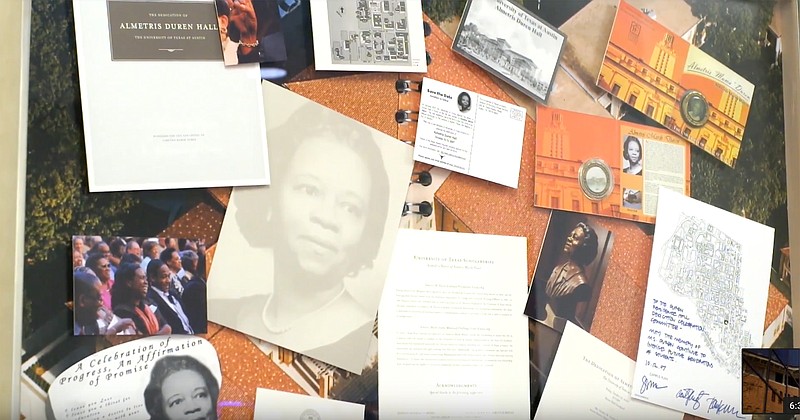Known as Mama D or Mama Duren to students whose lives she touched and shaped, Almetris Marsh Duren helped young scholars navigate college when the University of Texas at Austin integrated in the 1950s.
Duren became a pivotal figure in campus life, so much so her papers are stored at the university's Briscoe Center for American History, a residence hall and endowed scholarship were named in her honor and she received awards for her undying commitment to service.
Photo Gallery
Corazon Dinner
The annual Mexican-themed dinner held to benefit the Center for Artistic Revolution, Saturday March 7.
In 1956, UT first admitted black undergraduate students, and it fell to Duren to become the dormitory housemother for black women who joined UT but were relegated to housing far from the central campus. She later worked for the Dean of Students Office until her 1981 retirement.
For such African-American students joining UT, Duren was their lifeline: a mentor, helper and guide.
Mama D is also the subject of a new documentary film being completed. Titled "Still Overcoming," the movie is self-described as "a documentary about race, education and gentrification in Austin, Texas," according to its online promotional material.
The movie is being directed as a clear labor of love by Duren's nephew, a Los Angeles-based TV producer named Vidal Marsh, and the small, dedicated team working on it includes a former Texarkanian and 2002 Pleasant Grove High School grad, Ben Idom, who serves as producer. Now based in Nacogdoches, Texas, where he just completed a master's degree, Idom describes this story as essential to the state narrative.
Idom, himself a UT grad who studied radio, television and film there, admires Duren's bravery "to say yes to a job like that." Prior to joining UT, Duren taught at the historically black Huston-Tillotson College, where she'd graduated.
Noting Duren stood at less than five feet tall, Idom remains impressed that this "tiny little lady" signed up to be a counselor, advisor, dorm mom and all sorts of additional roles that benefited those young students during what must have been tumultuous times of change.
"She said OK, and she had a real servant's heart. That's something you don't see in a lot of people now," Idom said, describing her as a "servant of God" and a teacher, even if she wasn't a professor.
"You can always learn from somebody else's perspective," Idom said, adding of the life lessons she taught, "You can never be too patient." Students talked about her with reverence, describing Duren as their champion.
"That's just an honorable trait, to give yourself to other people," Idom said.
Prior to 1956, UT admitted its first black graduate students in 1950: Hemen Sweatt and George Washington Jr. at the UT Law School, John Chase at the architecture school.
And for fall enrollment in 1956, the first UT undergrad became John Hargis. Earlier that year, UT dorms integrated, while the Austin NAACP chapter called for an end to segregation in the city's public school system, according to a timeline of UT integration history posted online by the university's division of diversity and community engagement.
Among the students under Duren's care at the dormitory was Barbara Smith Conrad, a Northeast Texas native who later sang with the Metropolitan Opera and who, while a UT student, was removed from a school production of "Dido and Aeneas" after she was cast opposite a white actor. A 1958 photo shows her with Duren and other students at the dorm as they posed for a group portrait.
Duren herself co-wrote a book about UT integration, which has been used as a UT class text. Its title, "Overcoming: A History of Black Integration at the University of Texas at Austin," is echoed in the documentary's title.
In addition to Duren's legacy, the film explores other issues pertinent to the sociopolitical realities at UT and Austin, such as gentrification and diversity, placing her legacy within a larger context. The issues that were prevalent in Duren's time are still alive.
Much of the movie, which has a first look trailer posted online, was shot around Easter weekend this past year. Now, they're in the editing process.
"We're at work and trying to raise more money for the job to get it done in order to produce a great product," Idom said.
He says they envision it as the kind of documentary that could be on PBS for years to come, or perhaps shown on the Longhorn Network. The project has received a letter of support from KLRU, the PBS station in Austin.
Idom and the director met while working on the TV show "American Idol" as production assistants. "We were buddies throughout all different project," he said, noting Marsh forever talked about his aunt.
"It was a lingering story in his mind," Idom said, and eventually they made good on starting a full-length documentary about that story. They've partnered with a nonprofit organization called Media Alliance out of San Francisco-"that allows us to make this film in the right frame of mind, in the right spirit."
Idom believes it will be a film with true educational value. And now they're raising the funds to complete the project, which Idom also sees as part of the story of Austin, too, which people like to know. Working on a UT-related projected appealed to him.
"It's the continuing history of Texas," Idom said.
Originally, they planned on having "Still Overcoming" ready for festivals like SXSW next year, but the world of independent filmmaking forever poses financial challenges. Now they have a campaign going to raise the money and get the job done.
"We want this to be great, and we know that's going to take a little time," Idom said.
(On the Net: StillOvercomingFilm.com.)


